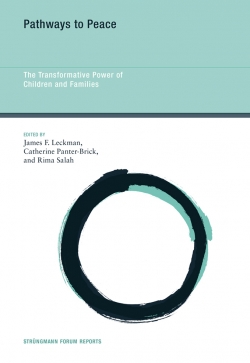What Has Worked & Why
What Has Worked & Why
General Framework for Early Childhood Interventions
Early childhood interventions aim to enhance the development as well as the well-being of children during their early years of life while also attempting to improve their family environments. When evaluating the success of such programs, important dimensions to consider include the age of child, a particular focus area (health, protection, violence prevention, engagement of fathers, etc.), whether the program is home-based versus center-based, the duration of the program, sponsorship, as well as the level of engagement with other sectors (ex. local government, national or international partners).
Historical Background
A majority of the research on early childhood development was conducted within the United States. US based studies found early childhood interventions had longer-term school-related benefits such as lower rates of dropout and lower referral to special classes, higher educational attainment, and low levels of gains in socioeconomic domain. For the research that was conducted outside the US, the Turkish Early Enrichment Program sustained gains in cognitive development and socioemotional benefits that influenced later parenting and family skills. There was also a study that took place in Jamaica that found long-term gains for early stimulation and nutrition interventions into adulthood have a direct correlation to positive family functioning and higher economic earnings.
Outcomes Associated with Peace
Peacebuilding can be defined as the skill and processes needed to promote better interpersonal relations, resolve conflicts, and establish harmony with the executive function being the ability to control impulses. It is reasonable to hypothesize that the executive function helps inhibit inappropriate reactions to frustration and express appropriate emotions. For example, children with higher executive function skills less likely to react violently or aggressively and the ability to suppress their impulses can be seen as early as the first year of life. Empathy, perspective taking, and moral reasoning contribute to resolving behavioral problems, addressing aggression, helping children build conflict resolution skills and learn positive, empathetic and constructive responses to difficult situations, all of which linked to violence reduction which in early childhood, can be linked to peacebuilding.
Overview of the Literature
Each piece of literature focused primarily on at-risk groups for cognitive development, educational attainment, and low levels of social participation and adjustment. The High/Scope Perry Preschool Project for example, contained an enriched preschool environment for children from disadvantaged backgrounds. This project also showed a variety of benefits experienced in early adulthood. For example, participants had attained a higher educational and economic status than the control group, less involvement in crime, as well as higher percentage of women participants achieved stable families. Some initial gains declined during middle childhood but reemerged in adolescence and early adulthood which supports idea that some immediate evaluations of early childhood interventions can be made prematurely.
The Abecedarian Project, long-term delivery of intensive multi-modal intervention, showed gains in cognitive development, school achievement, and occupational status and also resulted in social development benefits in lower levels of teenage pregnancy and substance abuse. It was also shown that benefits from preschool plus school age intervention surpassed benefits from preschool alone and that there is no advantage of preschool plus school-age intervention compared to school age intervention alone. The Chicago Longitudinal Study, a study with its primary focus being preschool intervention with parent involvement showed benefits in high school completion, low rates of special education and grade repetition, as well as low crime rates.
The Turkish Early Enrichment Project, center-based preschool environmental enrichment and home-based mother training with experimental design, assisted in the training of mothers to support the overall development of preschool-aged children, including the preparation for school. Immediate benefits in all spheres of development, cognition, school adjustment, school performance, and social acceptance by peers, resulted in higher levels of autonomy and less aggression. There were also benefits sustained in adolescence in cognitive development, school achievement and attendance, socioemotional development, and social integration. This program is now continued as Mother child Education Foundation (AÇEV).
From Projects to Programs and Policies: Implications for Exemplary Studies
Peers benefit and learn from a child’s peaceful orientation and gains can be achieved by the above programs in cognitive, educational, and socioemotional areas had implications for peaceful behavior. Intrafamily dynamics can be improved through these programs, particularly through better communication skills, demonstrating importance of system-level evaluation of programs, not just the individual-level. In regards to the engagements of mothers, increasing awareness of a mother’s role in enhancing children’s cognitive and socioemotional development, contributes to empowerment and building of self-efficacy and social capital. Belonging to group and group’s support help mothers persist in implementing more positive and “modern” parenting styles, particularly when they conflict with traditional social environments.
Short-term Evaluation Studies
Through systematic review of literature, examining the link between peacebuilding and early childhood, focus primarily on three categories of articles: prevention of behavior problems, improvement of intra family dynamics toward peaceful conflict resolution, and implementation in contexts of war.
Implications of Short-term Evaluation Studies for Peacebuilding
Partnering with government agencies or public institutions to work through already established service systems is valuable and contributes to project sustainability and increases the project’s’ potential to impact policy. A combination of home-visits and center-based visits seem to be most impactful and a clear theoretical perspective on change is vital for every intervention. The targeted age group of children may impact the ease of measuring peacebuilding outcomes or alternatively the cognitive competence of the children, also contributing to such outcomes. Peacebuilding may require interventions that address the entire family can help deal with harsh parenting, father engagement, as well as conflict resolution and parental involvement in disputes between siblings.
JOIN THE CONVERSATION
For breaking news and to stay connected, follow us on social media. Sign up to get our E-News delivered straight to your inbox.

